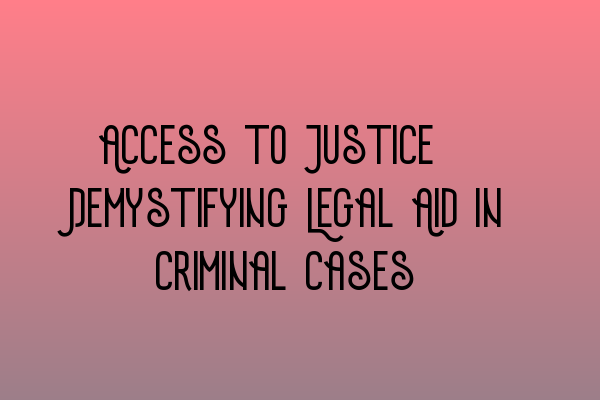Access to Justice: Demystifying Legal Aid in Criminal Cases
Introduction:
Access to justice is a fundamental right for everyone. In criminal cases, legal aid plays a crucial role in ensuring that individuals have fair representation and are able to present their side of the story effectively. However, legal aid can often be a complex and confusing topic, leaving many people unsure about how it works and whether they qualify for it.
In this blog post, we aim to demystify legal aid in criminal cases and provide you with a clear understanding of its importance and how it can be accessed.
The Basics of Legal Aid:
Legal aid is a government-funded scheme that provides financial assistance to individuals who are unable to afford legal representation. It ensures that individuals have access to justice, regardless of their financial situation.
Who Qualifies for Legal Aid?
To qualify for legal aid in criminal cases, certain criteria need to be met. These criteria typically consider factors such as income, assets, and the seriousness of the case. Eligibility for legal aid is means-tested, meaning that individuals with lower incomes are more likely to qualify.
Types of Legal Aid:
Legal aid can be provided in various forms, including:
- Legal Representation: This includes assistance from a lawyer who will represent you in court and provide legal advice throughout the process.
- Legal Advice: This involves obtaining advice from a lawyer without representation in court.
- Assistance at the Police Station: Legal aid may also cover the costs of having a lawyer present during police interviews.
The Importance of Legal Aid in Criminal Cases:
Legal aid is crucial in ensuring a fair and just legal system. It helps to level the playing field and ensures that individuals who cannot afford private representation still have access to quality legal services. Without legal aid, there would be a significant imbalance between those with financial resources and those without, creating a potential miscarriage of justice.
How to Access Legal Aid in Criminal Cases:
To access legal aid in criminal cases, you will need to follow these steps:
- Seek Legal Advice: Consult with a criminal defense lawyer to determine whether you qualify for legal aid and to understand the next steps.
- Provide Relevant Information: Prepare the necessary documentation to support your application for legal aid. This may include financial records, details about the case, and personal information.
- Submit the Application: Complete and submit the legal aid application form, ensuring that all required information is included.
- Wait for Approval: The Legal Aid Agency will review your application and make a decision based on the eligibility criteria. This process may take some time.
- Engage with Assigned Lawyer: If your application is approved, you will be assigned a lawyer who will guide you through the legal proceedings and represent you in court if required.
Conclusion:
Legal aid is a vital component of our justice system, ensuring that everyone has equal access to justice, regardless of their financial circumstances. By demystifying legal aid in criminal cases, we hope to empower individuals to seek the assistance they need and exercise their right to a fair trial.
For more information on related topics, check out these articles:
- SQE 1 Practice Exam Questions
- SQE 1 Practice Mocks FLK1 FLK2
- SQE 2 Preparation Courses
- SQE 1 Preparation Courses
- SRA SQE Exam Dates
